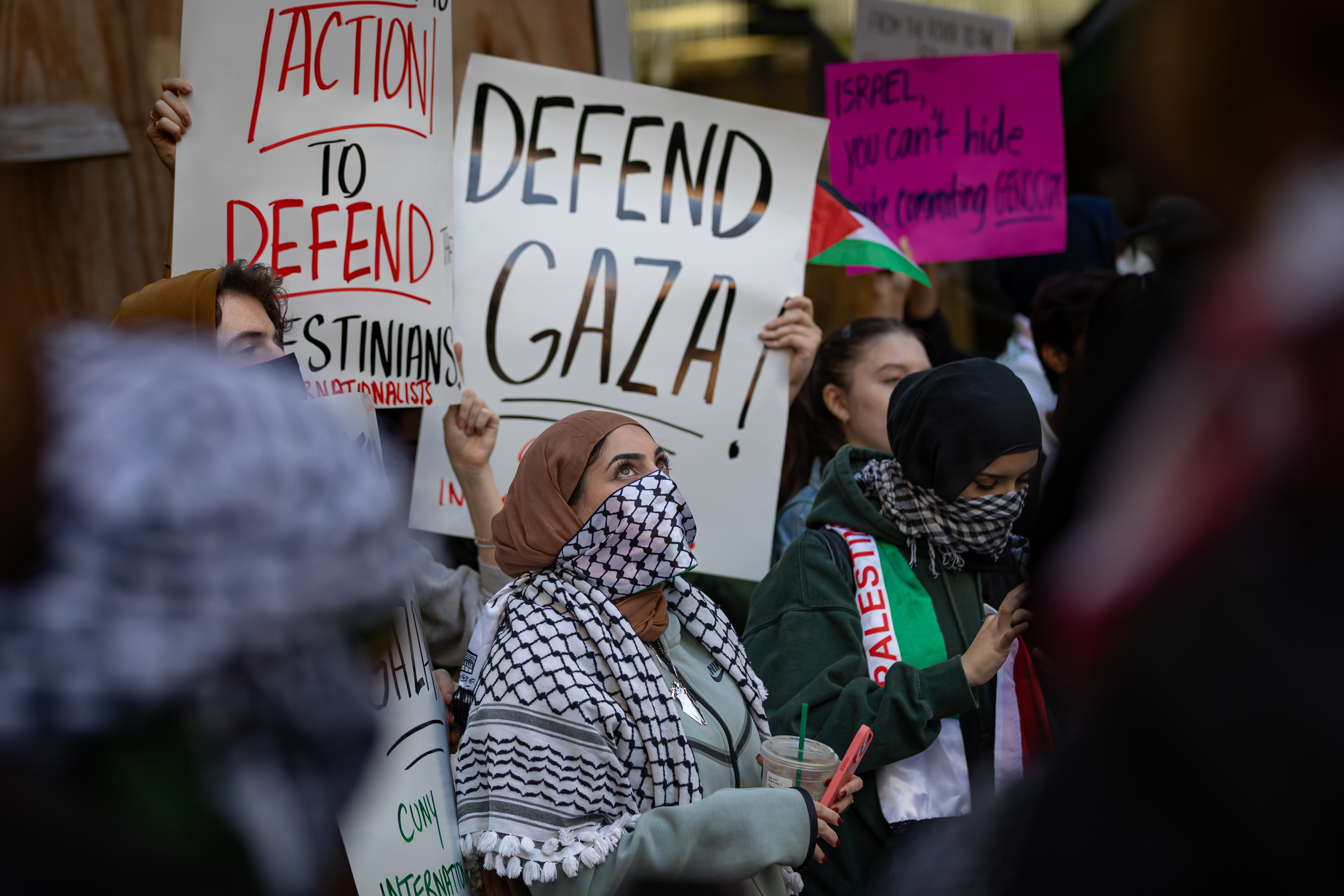The campus battle over the Israel-Hamas war
Student groups back Palestine, prompting a backlash and criticism of America's academic culture


A free daily email with the biggest news stories of the day – and the best features from TheWeek.com
You are now subscribed
Your newsletter sign-up was successful
The brutal war between Israel and Hamas has ignited an ugly battle, of a different sort, on America’s college campuses.
One of the hotspots, naturally, is Harvard University. The New York Times reported that Harvard has come under criticism from a former president, Larry Summers, after a coalition of pro-Palestine student groups called the “Israeli regime entirely responsible” for Hamas’ targeting of Israeli civilians. “I have never been as disillusioned and alienated as I am today,” Summers wrote. The backlash built from there: CNN reported that several American CEOs want participants in the letter blacklisted from future jobs, and USA Today reported that some of the students are being doxxed by a conservative media group.
But it’s not just Harvard. Tufts University condemned a student group that celebrated Hamas’ “creativity” in carrying out the brutal attack. A University of Virginia group faced backlash after issuing a statement that the attack “was not unprovoked.” A Stanford University instructor was suspended after reportedly singling out Jewish students and saying "This is what Israel does to the Palestinians.” A New York University law student had her job offer rescinded after also blaming Israel for the attack.
The Week
Escape your echo chamber. Get the facts behind the news, plus analysis from multiple perspectives.

Sign up for The Week's Free Newsletters
From our morning news briefing to a weekly Good News Newsletter, get the best of The Week delivered directly to your inbox.
From our morning news briefing to a weekly Good News Newsletter, get the best of The Week delivered directly to your inbox.
And it’s not just student groups. Inside Higher Ed reported that a number of “well-known” universities are facing criticism for “waiting multiple days before releasing statements on the attack.” Other conflicts — like the Ukraine-Russia war — have brought quicker responses, the critics said. “A failure to speak out is a failure of leadership—not only for your Jewish students, but for your entire university community,” Hillel International, a Jewish organization, said in a statement.
Increased tension on campus
The Israel-Palestine conflict has “for decades has fueled student and faculty activism,” The Washington Post reported. Colleges and universities have often found themselves wrestling with debates over whether to divest from Israel, for example, or seen angry arguments about campus speakers from either side of the divide. Now with bloodshed at a peak, many university leaders are attempting a tricky balance: “Renouncing the violence” while “sidestepping the contentious politics” of the clash.
That may not be possible. On campuses across the country, “there have been reports of harassment and assaults of both pro-Israel and pro-Palestinian students,” Reuters reported. Israel’s vow to obliterate Hamas — and the deaths of Palestinian civilians in Gaza — means “the campus climate may only become more tense in coming days.”
The anti-Israel tenor of the debates has prompted several members of Congress to discuss withdrawing federal funds from universities. “This desire for censorship is disappointing,” Sara McLaughlin argued at The Daily Beast. There’s a history of such censorship surrounding the Israel-Palestine conflict, “especially in higher education.” But those efforts merely chip away at individual rights offering little in the way of resolution to the underlying debate. “These censorship demands have not eliminated the source of conflict.”
A free daily email with the biggest news stories of the day – and the best features from TheWeek.com
'Objectionable, even outrageous'
“Students enrolled at our nation’s most revered academic institutions shouldn’t be celebrating the mass murder of innocent civilians,” New York University law professor Richard Epstein and attorney Alex Talel argue at The Hill. The failure to condemn student groups that excuse Hamas’ atrocities encourages “the notion that Israel’s mere existence is a provocation sufficient to justify the random slaughter of innocent men, women and children.”
Harvard President Claudine Gay on Thursday released a video trying to lower the temperature. “Our university rejects terrorism – that includes the barbaric atrocities perpetrated by Hamas,” she said. Harvard also rejects hatred of Jews, Muslims or any group based on their “faith, their national origin, or any aspect of their identity.” But, she added, Harvard also embraces free expression, even for “views that many of us find objectionable, even outrageous.”
Students and faculty in the United States may be angry, but they are relatively safe from the war’s violence. The Washington Post noted that “thousands of U.S. college students come to Israel” every year to study abroad. Now colleges and universities are scrambling to bring some of those students home and to touch base with parents. “Universities are all putting the student safety concerns above everything else,” said one official. For some students, at least, the war is more than a loud debate.
Joel Mathis is a writer with 30 years of newspaper and online journalism experience. His work also regularly appears in National Geographic and The Kansas City Star. His awards include best online commentary at the Online News Association and (twice) at the City and Regional Magazine Association.
-
 Will increasing tensions with Iran boil over into war?
Will increasing tensions with Iran boil over into war?Today’s Big Question President Donald Trump has recently been threatening the country
-
 Corruption: The spy sheikh and the president
Corruption: The spy sheikh and the presidentFeature Trump is at the center of another scandal
-
 Putin’s shadow war
Putin’s shadow warFeature The Kremlin is waging a campaign of sabotage and subversion against Ukraine’s allies in the West
-
 ‘Bad Bunny’s music feels inclusive and exclusive at the same time’
‘Bad Bunny’s music feels inclusive and exclusive at the same time’Instant Opinion Opinion, comment and editorials of the day
-
 ‘The censorious effect is the same, even if deployed covertly’
‘The censorious effect is the same, even if deployed covertly’Instant Opinion Opinion, comment and editorials of the day
-
 Is the Gaza peace plan destined to fail?
Is the Gaza peace plan destined to fail?Today’s Big Question Since the ceasefire agreement in October, the situation in Gaza is still ‘precarious’, with the path to peace facing ‘many obstacles’
-
 Trump demands $1B from Harvard, deepening feud
Trump demands $1B from Harvard, deepening feudSpeed Read Trump has continually gone after the university during his second term
-
 How Iran protest death tolls have been politicised
How Iran protest death tolls have been politicisedIn the Spotlight Regime blames killing of ‘several thousand’ people on foreign actors and uses videos of bodies as ‘psychological warfare’ to scare protesters
-
 ‘The science is clear’
‘The science is clear’Instant Opinion Opinion, comment and editorials of the day
-
 The Board of Peace: Donald Trump’s ‘alternative to the UN’
The Board of Peace: Donald Trump’s ‘alternative to the UN’The Explainer Body set up to oversee reconstruction of Gaza could have broader mandate to mediate other conflicts and create a ‘US-dominated alternative to the UN’
-
 ‘The economics of WhatsApp have been mysterious for years’
‘The economics of WhatsApp have been mysterious for years’Instant Opinion Opinion, comment and editorials of the day
